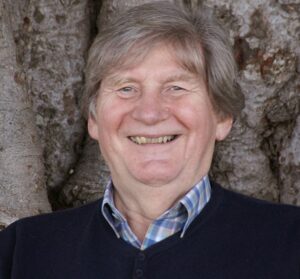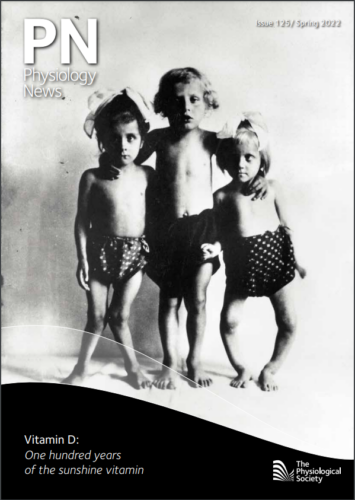
Physiology News Magazine
Obituary
Professor John Finlay Benzie Morrison (1942-2021)
Membership
Obituary
Professor John Finlay Benzie Morrison (1942-2021)
Membership
https://doi.org/10.36866/pn.25.46
Professor William Winlow, University of Liverpool, UK
Professor Arun V Holden, University of Leeds, UK

John Morrison, Emeritus Professor of Physiology at the University of Leeds, UK, died on 24 September 2021, aged 79, following the diagnosis of soft tissue sarcoma in 2018. He read medicine at the University of Edinburgh, the city of his birth, and during his undergraduate career revealed early leanings towards medical science, with prizes at the 2nd Bachelor of Medicine examinations in Anatomy, Biochemistry and Physiology, and an intercalated honours degree in Physiology in 1963. After graduation in medicine MB ChB in 1966, he spent a year doing medicine and paediatric surgery at the Western General Hospital, Edinburgh. In 1967 he was awarded an MRC Junior Research Fellowship, and while undertaking some locum GP work, and clinical assistantships in Clinical Neurophysiology, he worked on the effects of gonadal hormones and polypeptides on the nerves of the vascular system under the supervision of Professor Mary Pickford FRS, FRSE. During his thesis research he learnt the MJ Purves method for recording carotid body flow from Tim Biscoe, and the Iggo and Voigt method for extracellular recording from single active fibres from Alan Brown. In 1970 he was awarded his PhD and appointed as a Lecturer in the Department of Physiology at Leeds.
He established his mammalian neurophysiology laboratory, initially with recordings from single active fibres in single visceral afferents, whose projections were followed onto spinal cord interneurons using microelectrodes, and thus to sympathetic reflexes. This was at a time when workshopmade, custom-designed analogue recording electronic kit was being supplemented and replaced by manufactured digital systems. His research was mainly concerned with the spinal afferent innervation of viscera, and the influences these nerves have on autonomic and somatic functions, and in particular the lower urinary tract. He was promoted to Senior Lecturer in 1976, Reader in 1983 and to a personal chair in 1988. During this period, he was convenor of the Autonomic Special Interest Group of The Physiological Society. His publications include two books. The first, a volume on Visceral Sensation within the Progress in Brain Research series, was edited jointly with Fernando Cervero (Cervero & Morrison, 1986); the other, with Michael Torrens, on the Physiology of the Lower Urinary Tract (Torrens & Morrison, 1987), remains a landmark publication in this field.
Postgraduate and postdoctoral researchers trained in his laboratory have developed careers in physiology and medical research and became professors or consultants. John was particularly proud when Stephen McMahon (1954–2021), who completed his PhD in 1979, and moved on to a postdoctoral fellowship in Pat Wall’s laboratory, was appointed Sherrington Professor at King’s College London in 1996.
In 1986 John was awarded the Mahalanobis gold medal of the Indian Physiological Society. In 1992 he was awarded an FRCS(Ed) (ad hom) for his work on human pathophysiology, which involved collaborations with surgeons and physicians in Leeds and London. He was a Visiting Professor at the Tokyo Metropolitan Institute of Gerontology on three occasions in the 1990s, was awarded a medal by the Akita Medical Society in 1995, and elected a Fellow of the Institute of Biology in 1996.
He was Head of the Department of Physiology in Leeds from 1987 to 1992, and during his tenure of the Headship, the research and teaching profiles of the department were enhanced. Numbers of staff, postgraduate students, fellows, grant income and publications all increased, as research infrastructure moved from individual laboratories towards shared facilities. As student numbers increased, undergraduate teaching evolved, with the recruitment of teaching assistants and the introduction of computerised learning technology. During this expansion and reorganisation, John remained a very supportive and kindly colleague, encouraging and developing the careers of staff and students, while extending his research from physiology into pathophysiology. Sadly in 1989 his wife, Lynn, who had been his lynchpin since his time in Edinburgh, died of breast cancer.
In 1997, he decided to take early retirement from Leeds and was appointed as Professor and Chair of Physiology at the United Arab Emirates (UAE) University in Al Ain. As well as a busy teaching and administrative schedule, he continued research in both neuro-urology, and diabetic neuropathy. He was also involved in a long-term project that resulted in the translation into English of Trendelenburg’s seminal German paper from 1917 (Lammers et al., 2006). He actively promoted research both within the UAE University, through mentoring and committees, as well as in the UAE at large: chairing the Awards Committee of the Sheikh Hamdan Medical Foundation, John was much more than a dedicated and respected scientist and teacher.
In 2000 he married Dr Kath Rayfield, a former colleague from Leeds, and they enjoyed a happy family life with his two stepchildren and four grandchildren. During their time in the Middle East, they also became involved with higher education establishments in neighbouring countries, and travelled widely, enjoying the local foods, mountains and deserts. On their return to the UK, John was awarded emeritus status by the University of Leeds in 2008.
In his youth, John played violin, piano and organ, and was Dux in Music at Dunfermline High School in 1959. During his retirement he took up the violin and piano again and became a member of the Sinfonia of Leeds in 2011, regularly playing in their concerts. His involvement in music and travel was limited following the diagnosis of sarcoma in 2018, and he began to use his iPad for art. He continued to be intellectually engaged in physiology, and his last published paper (Morrison et al., 2019) was a Royal Society biographical memoir on his thesis supervisor, Mary Pickford.
References
Cervero F and Morrison JFB (eds) (1986). Visceral Sensation: Progress in Brain Research Volume 67. Amsterdam: Elsevier Science Publishers, 3–324.
Lammers WJEP et al. (2006). Translating Trendelenburg; Back to the future. Naunyn-Schmiedeberg’s Archives of Pharmacology 373, 134–138, http://doi.org/10.1007/s00210-006-0051-8.
Morrison JFB and Russell JA (2019). Lillian Mary Pickford. Biographical Memoirs of Fellows of the Royal Society 67, 371–400, https://doi.org/10.1098/rsbm.2019.0008.
Torrens M and Morrison JFB (eds) (1987). The Physiology of the Lower Urinary Tract. Springer London Ltd. ISBN: 9781447114512.
